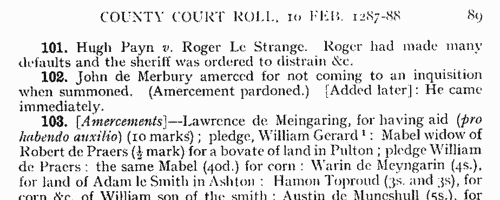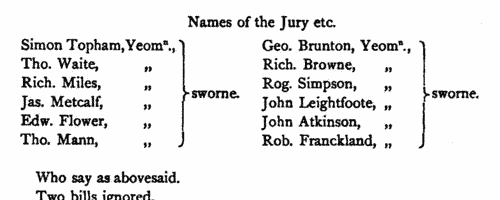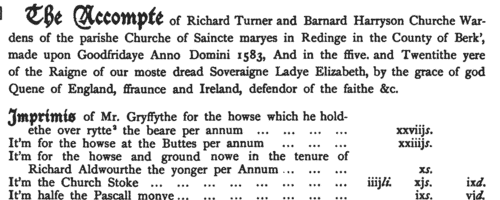Sellar Surname Ancestry ResultsOur indexes 1000-1999 include entries for the spelling 'sellar'. In the period you have requested, we have the following 141 records (displaying 1 to 10): Single Surname Subscription | | | Buying all 141 results of this search individually would cost £744.00. But you can have free access to all 141 records for a year, to view, to save and print, for £100. Save £644.00. More... |
These sample scans are from the original record. You will get scans of the full pages or articles where the surname you searched for has been found. Your web browser may prevent the sample windows from opening; in this case please change your browser settings to allow pop-up windows from this site. Northumberland Assize Rolls for the General Eyre
(1256-1279)
The royal justices made periodic general eyres through all the shires of England, hearing civil and criminal cases that had accrued from the lower courts. Here we have the assize rolls of three Northumberland eyres, 24 April to 7 May 1256; 25 June to 15 July 1269; and 20 January to 9 February 1279. The bulk of the text relates to civil pleas from the county of Northumberland and the town of Newcastle upon Tyne; finishing with abstracts of the pedes finium, or feet of fines (lawsuits or pretended lawsuits establishing the ownership of land) arising at the three eyres. But there are also criminal cases (as in the scan here), lists of bailiffs, &c.SELLAR. Cost: £4.00.  | Sample scan, click to enlarge

| Cheshire Court Rolls
(1259-1290)
Civil and criminal cases for most of Cheshire were handled by the county courts. Here we have the county court rolls for November 1259 to August 1260, December 1281 to September 1282, and December 1286 to September 1289. The city of Chester exercised its own jurisdiction, and here we have crown pleas and presentments from 1287 to 1297. The royal manor of Macclesfield in the east of the county had three independent jurisdictions - the hundred, forest and borough. Royal justices in eyre dealt with civil and criminal cases from the hundred and forest during their yearly visits, and here we have records from 1284 to 1290. Also covered by this index is an Inquest of Service in Time of War in Wales of 1288, listing knight's fees in the county. SELLAR. Cost: £4.00.  | Sample scan, click to enlarge

| Scottish litigants, rebels and cautioners
(1569-1578)
The Privy Council of Scotland exercised a superior judicial authority in the kingdom, and consequently received and dealt with a constant stream of petitions, as well as dealing with the internal security of the state. This register of the council from July 1569 to June 1578, in the reign of king James VI, was edited by John Hill Burton, Historiographer Royal for Scotland, and published under the direction of the Lord Clerk Register of Scotland in 1878. Some of the individuals mentioned are the complainants, those of whom they complained, and the sureties on both sides: at this period, some of the complainants are alleging serious attacks, often of a feuding nature. Many of the bonds entered into by the cautioners are promises to keep the peace towards such enemies. Failure to answer to the council when summoned was a serious contempt, leading to being denounced a rebel, with serious consequences. But 'horning' was also used in the pursuit of debts: there was no imprisonment for debt in Scotland, but a creditor could have an obstinate debtor ordered, in the sovereign's name, to pay what was due, failing which, the debtor could be put to the horn, denounced as a rebel, and imprisoned as a rebel.
SELLAR. Cost: £4.00.  | Sample scan, click to enlarge

| Scottish litigants, rebels and cautioners
(1578-1585)
The Privy Council of Scotland exercised a superior judicial authority in the kingdom, and consequently received and dealt with a constant stream of petitions, as well as dealing with the internal security of the state. This register of the council from 17 June 1578 to 31 July 1585, in the reign of king James VI, was edited by David Masson, and published under the direction of the Lord Clerk Register of Scotland in 1880. Some of the individuals mentioned are the complainants, those of whom they complained, and the sureties on both sides: at this period, some of the complainants are alleging serious attacks, often of a feuding nature. Many of the bonds entered into by the cautioners are promises to keep the peace towards such enemies. Failure to answer to the council when summoned was a serious contempt, leading to being denounced a rebel, with serious consequences. But 'horning' was also used in the pursuit of debts: there was no imprisonment for debt in Scotland, but a creditor could have an obstinate debtor ordered, in the sovereign's name, to pay what was due, failing which, the debtor could be put to the horn, denounced as a rebel, and imprisoned as a rebel. The main text (to page 762) is from the Acta Secreti Concilii, containing the minutes of the Privy Council, and of occasional Conventions of the Estates. After that are printed some miscellaneous Privy Council documents from the same years. The sources most productive of names, the Acta Cautionis and Registration of Bands, are also the most repetitive in form, and are not transcribed verbatim and literatim: nevertheless, one of the editor's rules was for 'All proper names and names of places occurring in the originals to be preserved in the abstracts without exception, and in the exact original spelling.'
SELLAR. Cost: £4.00.  | Sample scan, click to enlarge

| Scottish litigants, rebels and cautioners
(1585-1592)
The Privy Council of Scotland exercised a superior judicial authority in the kingdom, and consequently received and dealt with a constant stream of petitions, as well as dealing with the internal security of the state. This register of the council from 1 August 1585 to 31 July 1592, in the reign of king James VI, was edited by David Masson, and published under the direction of the Lord Clerk Register of Scotland in 1881. Some of the individuals mentioned are the complainants, those of whom they complained, and the sureties on both sides: at this period, some of the complainants are alleging serious attacks, often of a feuding nature. Many of the bonds entered into by the cautioners are promises to keep the peace towards such enemies. Failure to answer to the council when summoned was a serious contempt, leading to being denounced a rebel, with serious consequences. But 'horning' was also used in the pursuit of debts: there was no imprisonment for debt in Scotland, but a creditor could have an obstinate debtor ordered, in the sovereign's name, to pay what was due, failing which, the debtor could be put to the horn, denounced as a rebel, and imprisoned as a rebel. The main text (to page 774) is from the Acta Secreti Concilii, containing the minutes of the Privy Council, with intermixed Acta Proper (political edicts), Decreta (judicial decisions), Acta Cautionis (acts of caution) and Bands (registration of bonds). After that are printed some miscellaneous Privy Council documents from the same years: additional acts of caution (775-778); ordinances and acts anent the Borders and the North (779-814); and miscellaneous privy council papers (815-834). The sources most productive of names, the Acta Cautionis and Registration of Bands, are also the most repetitive in form, and are not transcribed verbatim and literatim: nevertheless, one of the editor's rules was for 'All proper names and names of places occurring in the originals to be preserved in the abstracts without exception, and in the exact original spelling.'
SELLAR. Cost: £4.00.  | Sample scan, click to enlarge

| Scottish litigants, rebels and cautioners
(1592-1599)
The Privy Council of Scotland exercised a superior judicial authority in the kingdom, and consequently received and dealt with a constant stream of petitions, as well as dealing with the internal security of the state. This register of the council from August 1592 to May 1599, in the reign of king James VI, was edited by David Masson and published under the direction of the Deputy Clerk Register of Scotland in 1882. The publication brings together the contents of the principal register (Acta Secreti Concilii) with acts and bands (bonds) of caution (surety) from the registers called Acta Cautionis (pp 561-730); Acts and Ordinances relating to the Borders and the North (731-748); and Miscellaneous Privy Council Papers (749-769). Many of the individuals mentioned are the complainants, those of whom they complained, and the sureties on both sides: at this period, many of the complainants are alleging serious attacks, often of a feuding nature. Many of the bonds entered into by the cautioners are promises to keep the peace towards such enemies. Failure to answer to the council when summoned was a serious contempt, leading to being denounced a rebel, with serious consequences.
SELLAR. Cost: £4.00.  | Sample scan, click to enlarge

| Merchants and traders in Aberdeen
(1399-1631)
A. M. Munro searched the council registers of the royal burgh of Aberdeen, and compiled this list of burgesses admited to the borough. The entries prior to 1591 were contained in lists engrossed in the council registers at the close of the minutes for the year ending at Michaelmas, but after that date in addition to the annual lists, which are continued, there is almost always a separate minute of admission under the respective dates. The records before 1591 are not only sparser, often with no more than a name, but are also lacking for 1401-1405, 1413-1432, 1434-1435, 1518-1519, 1557 and 1562-1564 - other blanks were filled in from the guildry accounts where such existed. Guild burgesses were allowed unfettered trading rights in Aberdeen; simple burgesses could only deal in Scottish wares (so being barred from the lucrative English and Flemish imports and exports); trade burgesses were limited to their own particular trades; and the council was able ex gratia to create honourary burgesses, who were accorded the full privileges of burgesses of guild and trade, and among whom numbered members of almost every family of note in Aberdeenshire. Burgesses could thus be created by descent, by apprenticeship into a trade, or ex gratia, and in the later portions of this roll the precise circumstances are usually given, sometimes also with the name of a cautioner or surety. Burgesses, masters and cautioners are all indexed here.SELLAR. Cost: £4.00.  | Sample scan, click to enlarge

| Gentlemen and yeomen of the North Riding of Yorkshire
(1647-1658)
The Quarter Sessions minute books for the North Riding from October 1647 to January 1658 were edited by the Rev. J. C. Atkinson for the North Riding Record Society and published in 1887. These are abstracts of sessional orders, minutes of criminal cases, memoranda and other entries of record concerning the administration of the riding. Adult male householders of substance (gentlemen and yeomen) from the constituent townships in the riding were liable to serve on the quarter sessions juries, and lists of the jurors present are attached to each part of the proceedings.SELLAR. Cost: £4.00.  | Sample scan, click to enlarge

| Inhabitants of Reading in Berkshire
(1550-1667)
The borough of Reading in Berkshire comprised three ancient parishes - St Giles, St Lawrence and St Mary. The churchwardens' accounts of Reading St Mary from 1550 to 1667 were transcribed by Francis N. A. Garry and A. G. Garry and published in 1893. The accounts, usually signed off by the two churchwardens and two surveyors of the highways for the year, listed the income and expenditure of the church. Income included annual payments for seats in the pews; rents from church property; fees for the use of the pall and for tolling the knell (knill) at funerals, and for opening graves; and sums received for 'gatherings', i. e. money gathered from communicants at Easter, Hocktide, Mayday, Hallowmas, Christmas and Whit. Expenditure was largely on maintaining the church fabric, and paying the minor officials - most of the names found on this side of the account are of local workmen busy with repairs.SELLAR. Cost: £4.00.  | Sample scan, click to enlarge

| Lancashire and Cheshire Marriage Licences
(1667-1680)
Licences for intended marriages in Chester archdeaconry, which covered Cheshire and Lancashire south of the Ribble (by far the most populous part of that county)SELLAR. Cost: £4.00.  | Sample scan, click to enlarge

|
Research your ancestry, family history, genealogy and one-name study by direct access to original records and archives indexed by surname.
|












